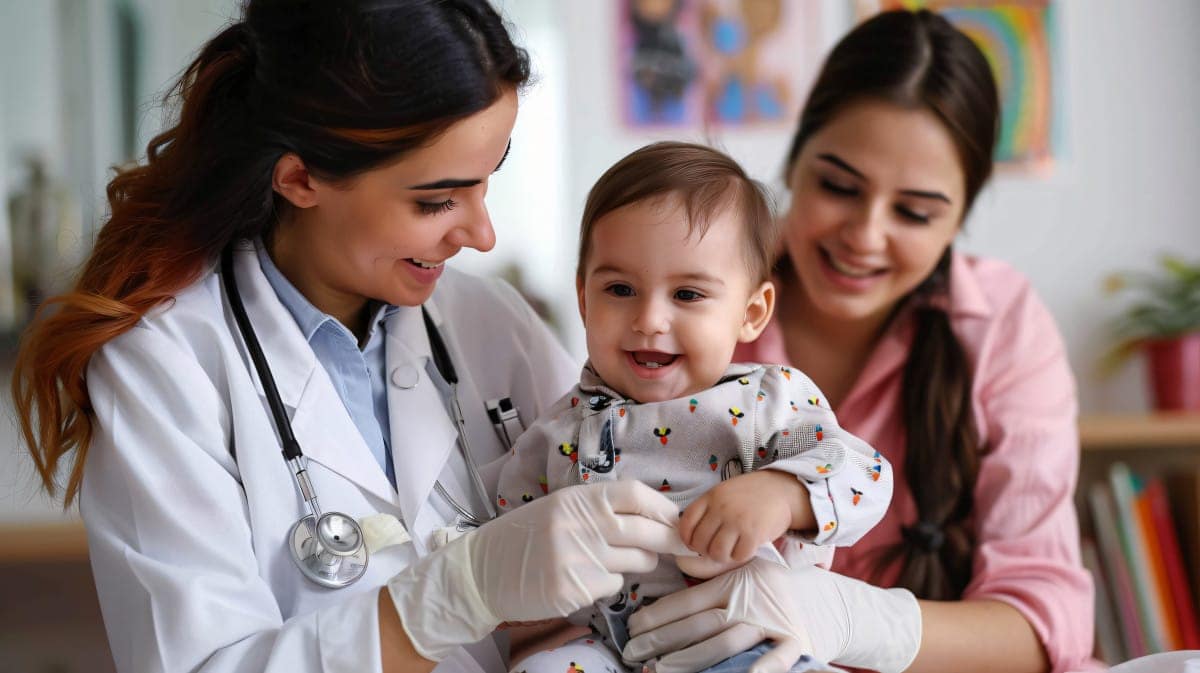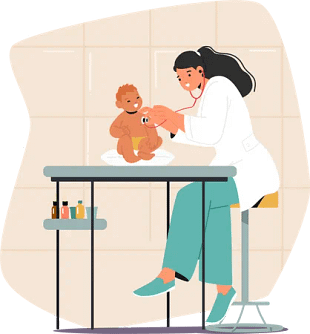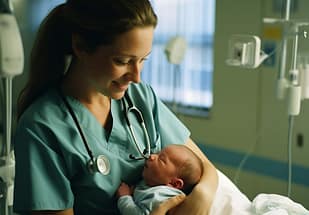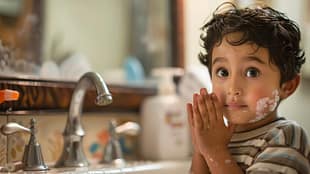
What to Expect During Your Baby’s Sixth Well-Child Visit (9 Months Old)
At 9 months, your baby’s well-child visit will focus on continued growth and development, as well as introducing new assessments related to diet, safety, and developmental milestones. Below are the key points you can expect during this visit:

33 Key Points to Expect During the Sixth Well-Child Visit
- Identify New Risk Factors
The doctor will assess any new risk factors related to both the baby and parents (Refer to Appendix 1). - Discuss Baby’s Diet
In addition to breastfeeding, the doctor will inquire about your baby’s diet, particularly the introduction of solid foods (Refer to Appendix 6). - Childproofing Discussion
You’ll be asked about childproofing measures in your home, including sleeping areas, furniture, and play zones, as well as ensuring toys are safe for your baby (Refer to Appendix 5). - Measure Growth
The baby’s weight, length, and head circumference will be measured and plotted on the growth chart to monitor growth. - Check the MCP Card
The doctor will review the completed MCP card (Green/Red zone). If not filled out, they will complete it with the mother and interpret the findings. - Assess Parent-Child Attachment
Observations will be made regarding the quality of attachment and the parent’s responsiveness to the baby’s cues and movements (Refer to Appendix 2). - Monitor Baby’s Response to Separation
The baby’s reaction when the parent leaves and returns will be observed to assess emotional and social development (Refer to Appendix 2). - Observe Play and Interaction
The doctor will watch how the parents engage in spontaneous play with the baby. If necessary, a play activity from the CCD card will be suggested. This includes observing how parents communicate with the baby, show love, and comfort the baby after immunization (Refer to Appendix 11). - Review Previous Visit’s Notes
Instructions and notes from the last visit will be reviewed to ensure progress and follow-up on earlier recommendations. - Checklist Review
The office staff’s completed checklist will be reviewed for key points to focus on during the consultation. - Health Concerns
Parents will be asked if they have any specific health concerns about the baby. - Behavioral Concerns
The doctor will inquire about any behavioral concerns and how the parents address those behaviors. - Vitamin D Prophylaxis
The baby’s vitamin D supplementation will be checked. - Parent-Baby Play Interaction
Parents will be asked how they engage in play with their baby, focusing on interaction and stimulation. - Parent-Baby Communication
Parents will be asked how they talk with the baby and promote communication and emotional bonding. - Encouraging Smiles
The doctor will inquire how parents make their baby smile and interact with them to elicit positive responses. - Growth Chart Interpretation
The updated growth chart will be interpreted to track the baby’s physical development. - Physical Examination
A general physical examination will be conducted to check for signs of anemia, rickets, and tooth eruption. - Systemic Examination
A systemic examination will be performed to ensure the baby’s organs and body systems are functioning properly. - Neurodevelopmental Assessment
If any concerns arise from the MCP card, a neurodevelopmental assessment will be conducted. - Vision Check
The baby’s vision will be checked for squint or other abnormalities, and the red reflex will be reassessed if it wasn’t done during the 6-month visit. - Hearing Test
A hearing test will be conducted by ringing a bell above and behind the baby’s ear to check responsiveness. - Immunizations and Vitamin A
The baby will receive scheduled immunizations and a vitamin A prophylactic dose. - Look for Red Flags of Neglect
The doctor will assess for any signs of neglect or physical, emotional, or sexual abuse (Refer to Appendix 4). - Counseling on Complementary Feeding
Parents will be counseled on the introduction of complementary feeding alongside continued breastfeeding. Encouragement of self-feeding with finger foods under supervision during family meals will be discussed. Parents will be advised to allow messiness and spillage as part of learning. The doctor will also explain the benefits of a proper diet and the consequences of poor nutrition. - Developmental Stimulation
Parents will be guided on age-appropriate developmental activities based on the MCP card. - Anticipatory Guidance
Parents will receive tips on recognizing and responding appropriately to their baby’s verbal, non-verbal, and emotional cues. This includes:
- Safe Toys: Give the baby clean, safe household items like spoons, bowls, or utensils with lids to handle, bang, and drop.
- Interactive Play: Engage in interactive lap games, make funny faces, and follow the baby’s interests.
- Encourage Independence: Allow the baby to sit independently, stand with support, and play with cause-and-effect toys or musical toys. Hide objects for the baby to uncover and show them how to use day-to-day items, such as drinking from an empty cup or stirring with a spoon in a bowl.
- Avoid Walkers: Parents will be advised not to use walkers or mobiles as they can hinder the baby’s natural development.
- Promoting Self-Feeding
Parents will be encouraged to allow the baby to self-feed using finger foods and to involve the baby in family mealtimes to foster independent eating habits. - Tummy Time
The doctor will emphasize the importance of tummy time to strengthen the baby’s muscles and improve motor skills. - Social Play
Parents will be encouraged to engage in social play activities that foster interaction, such as peek-a-boo or hide-and-seek. - Reading and Visual Stimulation
Parents will be advised to show picture books or family photo albums to stimulate the baby’s interest in visuals and language development. - Copying Actions
Demonstrating daily activities, such as drinking from a cup or stirring with a spoon, will help the baby develop an understanding of cause-and-effect and practical skills. - Monitor Baby’s Sleep Environment
Parents will be advised on creating a safe and childproof sleep environment to prevent accidents.
This comprehensive well-child visit ensures that your baby’s physical, emotional, and developmental milestones are assessed, while providing parents with guidance on nutrition, play, and safety.










































